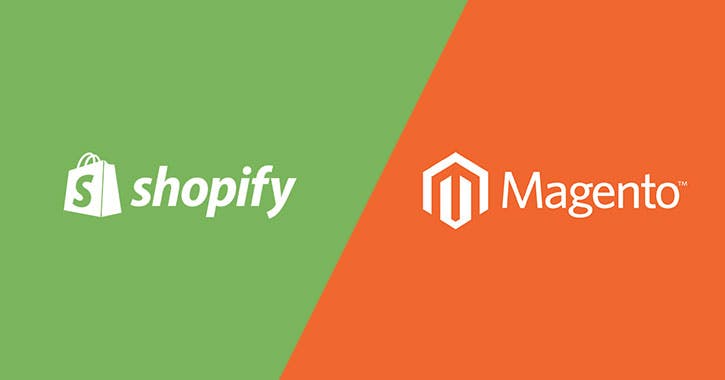So you may have decided that doing the easy thing is likely the best bet for you. Working with a cloud based CMS is the easy choice in a lot of cases. You may however discover that amongst the new cloud based, easy UX, e-commerce CMS choices there are really just three prize ponies. So let’s take a closer look at the 3 cloud based e-commerce segment leaders:
1. Shopify
Shopify is a beloved platform among small retailers and startups that want an easy to use, easy to setup eCommerce store.
The Good
• Hosted: As a hosted solution, setting up Shopify is extremely easy. An experienced user can get started in minutes. All the technical details of self-hosted solutions (like Magneto)—setting up host, installing software, handling scaling and performance—are taken care of by Shopify itself so you can focus on running your business.
• Easy to Use: Using Shopify doesn’t require a degree in Computer Science. It’s easy enough for beginners to start on their own and customize as they go along.
• Customer Support: Shopify operates a 24×7 support center that’s well equipped to handle all sorts of queries.
• Marketing: Shopify offers a range of in-built marketing features, from one-click landing page creation to blogs and custom SEO.
The Bad
• Price: The Shopify Unlimited plan starts at $179/month—a big sum, even with integrated hosting.
• Customization: While Shopify does a great job with its add-on library, creating your own custom plugins and extensions can be very tricky.
• Migration: If you cancel your Shopify account, your entire store and relevant data is deleted permanently. This lock-in feature can be a big deterrent if you want to move your store elsewhere.
Price: Starting at $29/month
Major Users: HardGraft, SMS Audio
Perfect For: Small businesses that want a simple, easy to use system with strong built-in designs.
<br />
2. Volusion
Volusion is often hailed as the industry standard for hosted eCommerce platforms. First launched in 1999, it has certainly been around long enough to earn that reputation. With a huge customer base and more than a decade’s experience, Volusion is one of the leading platform choices for many websites.
The Good
• Design: Volusion boasts an extensive collection of pre-built store designs. Not only are they stunning to look at, Volusion’s designs also adhere to the latest Ecommerce web design trends and standards.
• Marketing: Transforming a Volusion store into a marketing juggernaut is easy, thanks to features like search engine friendly design, ability to sell daily deals (like Groupon), coupon codes, sell products on Facebook, create email newsletters, etc.
• Hosted: Like Shopify, Volusion is a hosted solution. This means you can focus on running your store instead of dealing will the pesky technical details.
• Mobile Friendly: The central rule of business success is to be where your customers are. In 2013, this means the mobile phone. Every Volusion store comes with a mobile-friendly website built right in so you can tap every customer, every hit.
The Bad
• Hosting: With a hosted service, your store’s performance is dependent on the vagaries of the service’s servers. Volusion’s servers are notorious for going down periodically, which ultimately affects your business.
• Customer Support: While Volusion support is more than competent to handle your business queries, it fails the meet the bar when it comes to technical questions.
• Price: Although you can get starter plans for as little as $15/month, you’ll need at least the Gold plan – which costs $125/month – for running any decent sized store.
Price: Starting at $15/month
Major Users: National Geographic UK, Kammok, ShadesDaddy
Perfect For: Small to medium sized businesses who know their way around a web page and want to leverage third party apps.
<br />
3. BigCommerce
BigCommerce is one of the more prominent all-in-one eCommerce and shopping cart solution. It is favored by young startups and small retailers that value ease of use, reliability and affordability.
The Good
• Price: The standard Gold plan starts at just $79.95/month. Small stores with less than 100 products can even start at $24.95/month.
• SEO: BigCommerce ticks all the right boxes when it comes to SEO. You get automatic XML sitemap generation, search-friendly URLs and site hierarchy right out of the box. There’s also deep integration with newsletter service, iContact, for creating email marketing campaigns.
• Mobile Friendly: The platform was revamped in the last couple of years to favor mobile commerce. You get a free mobile friendly website built right in, meaning you can sell more and lose fewer customers.
• Ease of Use: BigCommerce’s strongest feature is its ease of use. You can get started right away with zero prior eCommerce or web design experience.
The Bad
• Designs: Design isn’t one of BigCommerce’s strong suites. While most built-in templates are solid, they do give off a slightly web 2.0 era vibe. Features such as responsive layouts and flat designs are still missing.
• Limited Third-Party App Support: Unlike Shopify or Volusion, BigCommerce’s built-in app library is very limited. While BigCommerce’s native features more than make up for this lack, you might run into some problems if you rely heavily on a third party solution.
• Customization: BigCommerce is designed for easy setup. This ostensibly means that more complicated features and options have to be hidden away, which makes extensive customizations difficult. Power users will find this especially frustrating.
Price: Starting at $24.95/month
Major Users: TravelKiddy, Hungrz, Supermuse, BrookFarm
Perfect For: Small businesses where ease of use and setup are a priority.
E-Commerce Tools, Apps or Plugins
One last thing, if you are leaning towards one platform or another it might be worth taking a look at the more advanced tools that are available. These tools become especially important when it comes to looking at scalability mainly because if one of these tools is crucial to running your business- and you are on a platform that does not offer them/it - then you may be forced into either costly customization, costly app construction or being forced to start over entirely (this is especially troublesome if you are on the Shopify platform as they do not have a good method for exporting you store data in one swoop). Let’s take a look at them more in depth platform by platform to see if there what/if advanced tools may be necessary for your store.
Shopify
While Shopify provides you with all the basic tools to create and operate a store, more advanced tools such as product reviews, customer wish list, product recommendations are only available in their App store where you have to pay for them.
These advanced tools will really help take your business to the next level, but you do have to make a financial commitment to using them, since they are not included as part of the basic Shopify package.
One really great feature from Shopify is their Shopify Payments feature (click here to see our review on it). So instead of signing up with a separate payment gateway (such as PayPal or Stripe), Shopify offers you their own payment gateway so you can manage all your money in their dashboard (saves you time). If you choose this option, they will also waive all transaction fees (more on transaction fees below) so it will save you money as well.
BigCommerce
Bigcommerce probably gives you the most comprehensive set of tools amongst all leading e-commerce builders. They have a lot more advanced tools available to you “out of the box”—so they’re included in the monthly fee. So in a way, you can say that you will get more value out of Bigcommerce since they provide you with a bit more advanced tools, which is nice.
Volution
Volusion has all the advanced tools to create, manage, market and secure a successful online business. It earned many rave reviews for the 2014 update mainly related to offering a large selection of website-design tools, excellent hosting options and the ability to integrate a storefront with Amazon.com and eBay. The software gives those without any HTML knowledge the ability to create unique, customized websites. For those who do have HTML skills, Volusion also offers an advanced mode that allows them to add their own flair.
Summary
While all provide you with the fundamental tools you need to run a good online store, Bigcommerce offers you a bit more advanced tools in their monthly packages and Volusion would fall somewhere in between. With Shopify, to get those similar tools, you will have to purchase an external App for them to integrate into your site.
Although Shopify’s Payments feature is an excellent tool that you really don’t have fumble around much with external payment gateway providers (just another party to deal with).
Overall, though, Bigcommerce has a bit more of an advantage here, but this is not to say you can’t build a fully functional business with Shopify—you definitely can (or Volution). Further, both Shopify and Volution offers you a much more comprehensive set of Apps and advanced tools for your business.
Selecting the right ecommerce builder for your business is by no means a straightforward decision. There are so many things to consider, so hopefully our review is helpful in steering you towards some of the key factors to evaluate.
A few key thoughts:
Hands down, Shopify has a much better collection of themes that can make your store look good. Even their free themes are really attractive.
Professional designers are tuned into what are working out there and what’s outdated. Leveraging off designers is a wonderful move by Shopify and it will ultimately benefit you.
Shopify also has 63% more paying customers than Bigcommerce.
Shopify’s themes are much more polished and attractive, they have 24/7 support.
BigCommerce has the best, most complete suite of out of the box advanced tools.
Volution, while trailing Shopify in the design department, has made big design strides in 2014 and has the best all-around features of the 3.
Our suggestion is for you to take up their free trial periods offered by all 3 to see which one works better for you.
Spend a few hours playing around with the builders and experience them for yourself. Really all 3 are among the top tier e-commerce builders in the market, and there are good reasons why they’re at the top.


